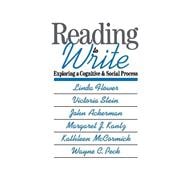
Note: Supplemental materials are not guaranteed with Rental or Used book purchases.
Purchase Benefits
Looking to rent a book? Rent Reading-to-Write Exploring a Cognitive and Social Process [ISBN: 9780195061901] for the semester, quarter, and short term or search our site for other textbooks by Flower, Linda; Stein, Victoria; Ackerman, John; Kantz, Margaret J.; McCormick, Kathleen; Peck, Wayne C.. Renting a textbook can save you up to 90% from the cost of buying.
| Introduction: Studying Cognition in Context | p. 3 |
| Reading-to-Write Assignment on Time Management | p. 26 |
| Excerpt from Task Representation Lecture | p. 28 |
| Reading-to-Write: Understanding the Task | |
| The Role of Task Representation in Reading-to-Write | p. 35 |
| Task Representation in Reading-to-Write: The Exploratory Study | p. 41 |
| The Power of the Organizing Plan | p. 43 |
| How a Task Representation Is Created | p. 53 |
| Costs, Benefits, Cognition, and Growth | p. 59 |
| Taking Metacognitive Control: Awareness versus Standard Strategies | p. 67 |
| Protocol Instructions | p. 72 |
| Reading-to-Write Assignment on Revision | p. 73 |
| Promises of Coherence, Weak Content, and Strong Organization: An Analysis of the Students' Texts | p. 76 |
| Rationale for the Two Taxonomies | p. 79 |
| Promises of Coherence: What Were Those Essays Doing? | p. 81 |
| Essay Categories and Instructions to Judges | p. 89 |
| Essays Using the Interpret-for-a-Purpose Organizing Plan | p. 92 |
| Inter-rater Agreement on Elaborated Taxonomy | p. 94 |
| Students' Self-Analyses and Judges' Perceptions: Where Do They Agree? | p. 96 |
| The Study | p. 98 |
| What Our Students Reported | p. 99 |
| Conclusions with Implications for Teaching | p. 108 |
| Self-Analysis Checklist | p. 112 |
| Total Number of Selections with Percentages from the Self-Analysis Checklist | p. 114 |
| Reading-to-Write: Cognitive Perspectives | |
| Exploring the Cognition of Reading-to-Write | p. 119 |
| An Examination of Cognitive Processes | p. 121 |
| The Cognition of Reading-to-Write: A Case Study Perspective | p. 125 |
| Looking for Patterns: The Quantitative Analysis | p. 139 |
| Summary Statistics | p. 142 |
| Pearson Correlation Matrix | p. 142 |
| Multiple Regression Results | p. 143 |
| Multiple Regression Results | p. 143 |
| Elaboration: Using What You Know | p. 144 |
| The Role of Elaboration in Reading-to-Write | p. 146 |
| The Protocol Study | p. 148 |
| Conclusion | p. 153 |
| The Effects of Prompts on Revision: A Glimpse of the Gap Between Planning and Performance | p. 156 |
| Procedure | p. 156 |
| Key Observations | p. 157 |
| The Effect of Prompts on Organizing Plans | p. 159 |
| Protocol Analysis | p. 161 |
| Negotiation Within an Instructional Setting | p. 164 |
| Writers Revise Differently | p. 168 |
| Reading-to-Write: Social Perspectives | |
| Translating Context into Action | p. 173 |
| Locating Context: In Writers, In a Culture | p. 176 |
| The Students' Opening Moves: Origins in a Literate Culture | p. 182 |
| Asking Questions of a Legacy | p. 189 |
| The Cultural Imperatives Underlying Cognitive Acts | p. 194 |
| The Need to Place Student Writing in Broader Cultural Contexts | p. 194 |
| Learning to Recognize Assumptions Underlying Students' Writing | p. 195 |
| Developing Complementarities Between Rhetorical and Literary Theories: Reading for Absences | p. 196 |
| Ideology and Students' Writing | p. 198 |
| The Invisibility of Ideology in the Educational System | p. 200 |
| Three Ideological Assumptions Guiding Students' Writing | p. 202 |
| Interview Questions for Students | p. 216 |
| Uniting Cognition and Context | |
| Negotiating Academic Discourse | p. 221 |
| A Conceptual Framework | p. 221 |
| Developing an Organizing Idea | p. 233 |
| The Tacit Transition to Academic Discourse | p. 245 |
| References | p. 253 |
| Index | p. 263 |
| Table of Contents provided by Syndetics. All Rights Reserved. |
The New copy of this book will include any supplemental materials advertised. Please check the title of the book to determine if it should include any access cards, study guides, lab manuals, CDs, etc.
The Used, Rental and eBook copies of this book are not guaranteed to include any supplemental materials. Typically, only the book itself is included. This is true even if the title states it includes any access cards, study guides, lab manuals, CDs, etc.